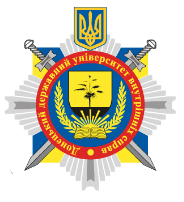REMOTE WORK OF STATE CIVIL SERVANTS DURING THE PERIOD OF MARTIAL STATUS
DOI:
https://doi.org/10.32782/2523-4269-2022-81-4-2-25-29Keywords:
labor discipline, remote work, civil servants, disciplinary sanctions, disciplinary responsibility.Abstract
The article analyzes the problematic aspects related to ensuring the proper conditions for remote work in martial law conditions by workers and employees of various categories. Attention is focused on the effectiveness of the norms of the current legislation regarding disciplinary penalties that can be applied to a separate category of employees for committing a disciplinary offense. The main grounds for bringing to disciplinary responsibility were characterized and the grounds for applying disciplinary sanctions that could be applied to civil servants were adjusted in the conditions of martial law. Definitions of legal definitions and legal institutions are given. Remote work is a form of work organization in which the work is performed by the employee outside the workplace or the territory of the employer, in any place of the employee’s choice and using information and communication technologies Outside of Ukraine, civil servants and employees of state bodies can work remotely only in the event of a business trip issued in accordance with the established procedure. If a civil servant or an employee of a state body in Ukraine is outside the workplace during working hours without the decision of the head of the civil service or abroad, they may be subject to disciplinary action in accordance with the law. In accordance with the provisions of the current legislation, the following sanctions may be applied: remarks, reprimand, warning about incomplete service compliance, dismissal from the civil service position. Disciplinary liability of employees is an effective means of influencing the discipline of employees, a legal guarantee of their proper performance of labor duties, realization of rights, compliance with restrictions and prohibitions. Civil servants are entrusted with an important and responsible mission to ensure the public, practical and professional performance of tasks and functions of the state. Even in peacetime, governmental activity cannot be called easy due to the complexity of the tasks and functions of the state and the professional demands for their implementation, and in the conditions of martial law, the attitude of a civil servant to the performance of his professional duties must be even more responsible. Therefore, in accordance with the constitutional principle of the separation of powers, the court in specific disputed legal relations governed by special provisions of the law must interpret the specified norm narrowly, applying all methods and approaches to implement an interpretation as close as possible to the Constitution of Ukraine, until the moment when it receives the opposite, and apply the principle rule of law On the basis of the obtained results, key issues that require further legislative regulation to strengthen statehood and protect the social and economic rights of employees during remote work under martial law conditions have been determined.
References
Про деякі питання організації роботи державних службовців та працівників державних органів у період дії воєнного стану : Постанова Кабінету Міністрів України від 26.04.2022 р. № 440. URL: https://zakon.rada.gov.ua/laws/show/440-2022-%D0%BF#Text (дата звернення: 17.11.2022).
Про затвердження типових форм трудового договору про надомну та дистанційну роботу : Наказ Міністерства розвитку економіки, торгівлі та сільського господарства України від 5 травня 2021р. № 913-21. URL: https://zakon.rada.gov.ua/laws/show/z0886-21#Text (дата звернення: 17.11.2022).
Про організацію трудових відносин в умовах воєнного стану : Закон України від 15.03.2022 р. № 2136-IX. URL:https://zakon.rada.gov.ua/laws/show/2136-20#Text (дата звернення: 17.11.2022).
Деякі питання організації роботи працівників суб’єктів господарювання державного сектору економіки на період воєнного стану : Постанова Кабінету Міністрів України від 26.04.2022 р. № 481. URL: https://zakon.rada.gov.ua/laws/show/481-2022-%D0%BF#Text (дата звернення: 17.11.2022).
Юридична відповідальність та інші примусові заходи у трудовому праві : навчальний посібник. / М.І. Іншин, В.І. Щербина, І.М. Ваганова. Харків : Золота миля, 2012. 495 с.
Кодекс законів про працю України : Закон України від 10 грудня 1971 р. № 322-VIII. URL: https://zakon.rada.gov.ua/laws/card/322-08 (дата звернення: 17.11.2022).
Про державну службу : Закон України від 10.12.2015 р. 889-VIII. URL: https://tax.gov.ua/diyalnist-/zakonodavstvopro-diyalnis/zakoni-ukraini/72725.html (дата звернення: 18.11.2022).
Про затвердження порядку здійснення дисциплінарного провадження : Постанова Кабінету Міністрів України від 04.12.2019 р. № 1039. URL: https://zakon.rada.gov.ua/laws/show/1039-2019-%D0%BF#Text (дата звернення: 18.11.2022).
Актуальні питання державної політики щодо державної служби. Семінар. Національна школа суддів України. URL: https://supreme.court.gov.ua/supreme/pokazniki-diyalnosti/navch_suddiv_praciv_aparativ_2021/1288312/ (дата звернення: 18.11.2022).
Конвенція про захист прав людини й основоположних свобод від 04.11.1950. URL: https://zakon.rada.gov.ua/laws/show/995_004#Text (дата звернення: 18.11.2022).
Щодо нез’явлення державних службовців на роботу та надання їм відпусток під час воєнного стану, а також оформлення відносин із державними службовцями, яких зараховано до територіальної оборони. Роз’яснення НАДС № 149-р/з. від 04.03.2022 р. URL: https://document.vobu.ua/doc/10335 (дата звернення: 18.11.2022).
Жигалкин П.И. Правовое регулирование сроков в трудовых отношениях : автореф. дис. ... канд. юрид. наук. Xарьков, 1974. 23 с.
Трудове право : підручник / за заг. ред. В.В. Жернакова. Харків : Право, 2012. 496 с.





